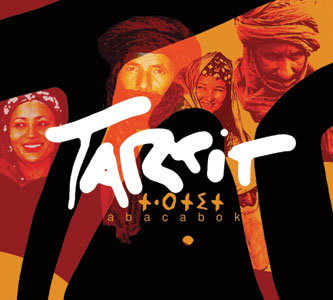
Nothing is more evocative of the fascinating expanses of the Sahara desert than the music of Tartit, a Tuareg band consisting of five women and four men residing in the Timbuktu region (Mali). Unlike that other renowned Tuareg band, Tinariwen, Tartit play quiet, hypnotic, trance-inducing music: the women sit down, sing, and play cyclic rhythms on their tinde drums, while the men accompany them on string instruments, acoustic and electric. The men are veiled, the women aren't. Tuareg society is one of the few throughout Africa in which women are allowed to choose (and divorce) their husbands. Tartit have toured Europe (a.o. as part of the Desert Blues shows alongside Afel Bocoum & Habib Koite). The album was recorded in the desert by Congotronics producer Vincent Kenis on his mobile studio.
1. Tabey Tarate: this piece accompanies a certain type of very physical dance practised only by men. They must try to show their strength and elegance. The lyrics encourage them to perform as well as they can.
2. Ansari: the name of the tribe to which Tartit belong
3. Eha Ehenia: a song about a woman who is a disgrace for her family: she is a bad host to strangers, and even to her in-laws…
4. Al Jahalat: against ignorance. "Hey girls, the time has come to leave ignorance behind. People are counting stars, while we're here making ropes to tie up our animals"
5. Achachore I Chachare Akale: "As a was laying under a tree, I heard a sound saying : death can surprise you at any moment. Nothing is permanent. Never be sure of anything: be it misery or happiness, things can rapidly change".
6. Chargouba: to be a rich man, you must own at least a hundred cows, like Ali and Hamta, the characters in this song.
7. Assinaina: in praise of union. All Tuaregs must unite and strive for economic independence. Only work can make men free.
8. Tihou Beyatene: the voices of the desert… a song sung by two sisters to encourage their brother, who travelled long distances to find pastures for his herd.
9. Houmeissa: "I salute this white girl who wears her indigo veil and her houmeissa around her neck".
10. Abacabok: when Hawalane, sufi great-great-great-grandfather, a Sufi, decided to leave the camp and stop eating, the family griot went looking for him. The old men offered him half of his belonging if he didn't play, but the griot refused and started playing his music. The old man started trembling, and immediately came back to his family. Music really does perform miracles.
11. Al Afete: a prayer for peace
12. Tadsaq: a song in praise of traditional family bonds (Tadsaq means "union"), which are endangered by the progress of materialism in today's Tuareg society
13. Inbahwa: the oldest song of the repertoire, performed on the one-stringed imzad gourd violin. The imzad is the most ancient Tuareg instrument. In the old days, only noble women were allowed to play it.
Tartit:
Fadimata Walett Oumar : vocals, tinde drum
Walett Oumar Zeinabou: vocals, tinde drum
Mama Walett Amoumine: vocals, tinde drum
Fadimata W. Mohamedun (Fatma): vocals, tinde drum
Tafa Al Hosseini: vocals, imzad
Amanou : 3-string tehardent lute, vocals
Ag Mohamed Idwal: 4-string tehardent lute
Mossa ag Mohamed: vocals
Mohamed Issa ag Oumar: lead electric guitar, vocals
Guests:
Tinalbaraka and the women and men from the Tinaguimine, Gargando, Dag Aljoumaat and Tinlokiane encampments (vocals on 3, 8).
Afel Bocoum: lead vocals, guitar (5).
Oumar Diallo: bass (1, 5).
Alpha Oumar Sankaré: calabash (1, 5).
Alhassan Hamadoun Sarre: njarka violin (5).
Yoro Cissé: njurkle (5).
Mamadou Ousmane Kelly: guitar (5).
Nasser: bass (2, 9).
Ehat: guitar (2, 9).
Mohamed: flute (11).
Kimi: imzad (13).
Produced by Vincent Kenis & Michel Winter
Recorded in the desert around Gargando (Timbuktu region) and at the CCF in Bamako.
Mixed by Vincent Kenis at Studio XXL, Brussels







